| |
11th
Annual Guelph Jazz Festival & Colloquium
Guelph ON, 8-12 September 2004
by Matthew Sumera
October 2004
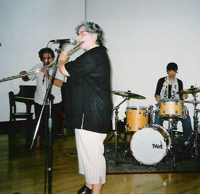 |
|
(Left to right) Jean Derome, Ellen Waterman,
and Susie Ibarra in workshop performance
|
This year's now legendary Guelph Jazz Festival continued to live up
to its reputation of providing musicians and fans of jazz and improvised
music with an unparalleled opportunity to create and hear a variety
of sounds, musical combinations, and performances that would unlikely
exist were it not for the festival. Through a combination of workshop
performances, keynote lectures by Amiri Baraka and Archie Shepp, an
academic colloquium, and a variety of concerts peppered throughout
the city, the Guelph Jazz Festival approaches its programming seriously,
ideologically, with the hope of showing how jazz and improvised music
can help bring about a better, more equitable world.
While this is an admirable goal, music is often a sketchy affair,
as anyone involved either as a performer or organizer will attest.
Simply, as Anthony Braxton has stated in Forces in Motion,
"the history of music evolution is not the history of nice guys, it's
the history of human beings who have their frailties, their strong
and weak points". What happens when real people are superimposed upon
a political construct is perhaps inevitable and is resistant to any
neat critical formation. This year's festival brought that into striking
relief and will most likely continue to be the stuff of debate and
controversy for many more festivals to come. But let us get to that
later.
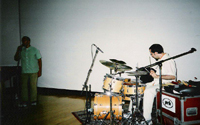 |
|
Theo Bleckmann and John Hollenbeck: electronicatrancefreejazz
|
Guelph's festival has much going for it, some benefits being perhaps
less obvious than others. The size of Guelph, a small college town
an hour southwest of Toronto, is ideal for a jazz festival. There
are enough restaurants and establishments nearby, but not enough to
distract the music fan from the business at hand. Because of its size,
concertgoers ultimately form quick connections with one another, and
after the first day, addresses and business cards are exchanged. Meals,
libations, and rides are shared. Festival sponsors are knowledgeable,
organized, and responsive, and several are impressive musicians within
their own right. It is an enviable community, displaying a palpable
commitment to and love for music.
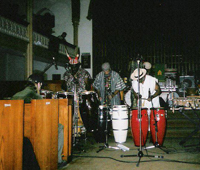 |
|
Pieces of Time laying it down
|
The music selected for this year's festival focused on the sound of
the voice in all its incarnations. With a heavy emphasis on the female
voice, performances included a workshop group of women singing, the
impeccable cellist and vocalist Anne Bourne (in trio and workshop
setting), festival "regular" Yoon Sun Choi and her group 4inObjects,
and Susie Ibarra's trio. Standouts were many, but the honors tended
to go to the lesser-known acts. A blistering set by the group Barnyard
Drama (with the twinned guitars of Justin Haynes and Bernard Falaise)
featured the almost exclusively non-linguistic vocals of the phenomenal
Christine Duncan. Her range is extraordinary, and she benefited from
the sensitive support of Jean Martin on drums and electronics. The
entire set was an early highlight with the last track morphing into
a freaked-out country tune, complete with Pentecostal glossolalia,
degenerating into the festival's first standing ovation. Another highlight
was the voice/drums duo of Theo Bleckmann and John Hollenbeck. Focused
on prepared kit (made to sound almost electronic), repetitive rhythms,
and heavily processed vocals, it was a hypnotic affair, moving toward
electronica at times.
The better-known groups didn't fail to deliver, with Oliver Lake in
particularly fiery form. Depending upon appetite, Mary Redhouse's
ability to mimic a variety of birds was either moving or an utter
distraction. Either way, the set was filled with driving rhythms and
keening solos from all. Andrew Cyrille's "Pieces of Time" picked up
the drummer's long-term project, first recorded under that name in
1984. Now featuring Cyrille and original member Famoudou Don Moye,
two more percussionists, Obo Addy and Okyerema Asante, have also joined
the mix. While their performance lacked anything truly profound, it
was inspiring to hear the group cut loose. Following the form of the
original recording, all drummers made "personal statements", with
highlights from Moye and Cyrille.
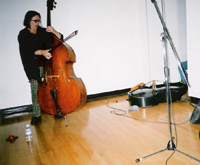 |
|
Joëlle Léandre and Barre Philips
on ghost-bass
|
Joëlle Léandre and India Cooke performed in an intuitive,
moving duet, showcasing their complete musicianship and mastery of
their respective instruments. Léandre also performed in an
ad hoc workshop with Ibarra, Jean Derome, Anne Bourne, and Guelph
faculty-member Ellen Waterman. Those in the United States who have
never heard Jean Derome must search out his work immediately. He is
a master musician and an incredibly powerful flautist. The performance
also included the ghost-bass of one Barre Phillips, hidden by the
room wall, dragging his bass across the floor, sliding it back and
forth, and generally making merry.
The most talked about event of the entire festival, however, was none
of the above. Rather, it was a by now heavily discussed performance
by the trio of Sainkho Namtchylak, William Parker, and Hamid Drake,
which involved the nearly unprecedented halting of the performance
and pulling of Namtchylak from the stage, shortly after a mass exodus,
because of Namtchylak's willful defiance of both audience and
musical partners. The irony of such a move at a festival as ideologically
and politically invested as that of Guelph did not go without notice,
and the comments by those members of the crowd who called for a pubic
apology went unanswered.
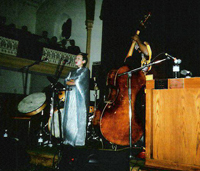 |
|
Sainkho Namtchylak and William Parker prior
to the hook
|
Ultimately, the performance was a painful moment, both for fans of
improvised music and certainly for the concert promoters. The decision
to remove Namtchylak only resulted in the eventual continuation of
the performance, which ended up going much longer than originally
scheduled; if one is to yank, one must be committed to that decision.
The inevitable roars of the crowd and the comments about "acts of
violence against the artist" were not surprising. In many ways, the
Namtchylak affair was built into the very fabric of the festival,
with the crowd trained to read music as an inherently political act.
The conflation of musical freedom with explicit struggles toward political
freedom are by no means new—one need only look at the career
of Albert Ayler to see how the political can be misapplied to the
aesthetic. What is new, though, is the censorship of those who do
not conform to the ideal. Had the performance continued as is, it
would have simply been a bad show (not unlike the mess that was Ursel
Schlicht's Ex Tempore Project, a musical disaster that also resulted
in a mass exodus). Instead, the show was interrupted, directly calling
attention to a conflict between theory and practice. What seemed to
have been lost on the promoters of the event is that music is made
by people, sometimes disturbed, sometimes difficult. To lose sight
of this is to lose sight of the power of music, and to ultimately
construct a very different tale.
This event, certainly controversial, unfortunately hangs over the
11th annual Guelph Jazz Festival to an undue extreme. What is lost
by simply focusing on the event and the aftermath are the days of
concerts and colloquium presentations that were revelatory, moving,
and transformational. Guelph truly is a one of a kind festival supported
by committed promoters who love the music. It is a place where, after
a workshop entitled "Instruments Voices Narrative", a group of improvisers
from around the world—Hamid Drake, Barre Phillips, Susie Ibarra,
Joëlle Léandre, William Parker, Jean Derome, Anne Bourne,
and Ellen Waterman—can chat and linger, unmolested by the audience,
and yet not directly removed from them either. It is a place where a real
community feeling is pervasive, where a bunch of people who have never
met become friends and share many meals. It is a place where people
freely offer a ride to the next show and exhibit real compassion when
an altercation with drunkards over a D'Angelo t-shirt nearly turns
ugly. It is a place where the music can call home, and where one can
easily anticipate returning to again and again.
|
|
|
|
|

